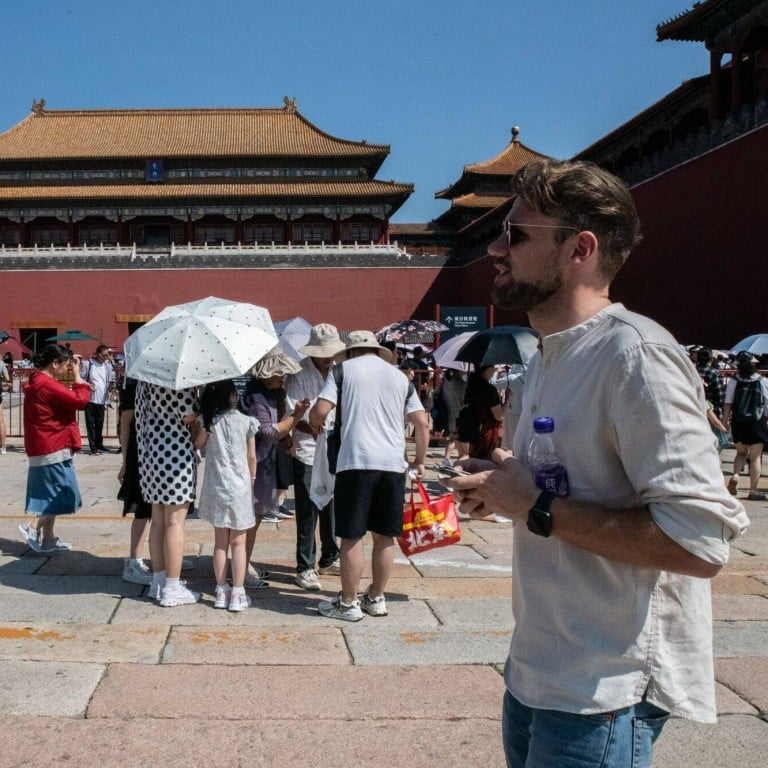
China’s visa-free offer boosts inbound travel, but Chinese tourists still prefer to stay home
- One month after visa waiver policy was introduced for six countries, China’s reputation as popular Asian travel destination shows rebound
- But slow domestic economy, regional security concerns continue to keep Chinese travellers close to home
Le Guyader, founder of China Roads, a French travel agency based in Dinan that specialises in selling trips to China, said the unexpected move had exceeded expectations, with inquiries last month up 20 per cent compared to pre-Covid levels.
“It’s only a one-year policy, no one knows what will happen one year later, so we persuade our customers to seize this opportunity and plan their trips to China,” Le Guyader said.
“We expect a recovery from the past three years where [my company had] almost zero turnover in China.”
China travel trends for 2024: visas made easier, more cultural tourism
In the month since the policy was introduced, inbound travel to China from the six countries granted visa-free status rose nearly 30 per cent to 214,000 compared to November, according to the Chinese National Immigration Administration.
Of those travellers, 55 per cent entered China visa-free in December, according to the administration’s website.
Travel agencies based in China that serve foreign tourists have also seen encouraging activity.
Dai Feng, who runs Asia Odyssey Travel in Chengdu in Sichuan province, said more than 10 tour groups from Spain and Germany booked trips to China through his company after the visa-free policy was introduced.
Dai said business had improved enough that he planned to boost his marketing budget for this year.
Mary Ma, who manages a travel agency based in Beijing, agreed that things were looking up.
“Many tourists from Western countries are actually very interested in exploring China, but the visa application was complicated in the past, which often discouraged travel,” she said.
“The new policies encouraging inbound travel are a big boost for business, and we are quite optimistic about the industry outlook.”
Singapore, meanwhile, has announced a 30-day mutual visa exemption scheme with China to be implemented this year.
China, also intends to increase its number of regular international flights. The Civil Aviation Administration of China said on Thursday it planned to have 6,000 international flights per week scheduled by the end of 2024, about 80 per cent of its pre-Covid levels.
China pledges more flights, simpler entry procedures to facilitate exchanges
“I have contacted some travellers who cancelled their trip in 2020 to China. Some of them have negative views on China now after seeing how China coped with Covid-19, and do not want to go back to China,” Le Guyader said.
Charlie Chen, who manages Easy Tour China, a Guangxi-based travel agency, said he hoped the government would allow more convenient payment methods.
Alipay and WeChat Pay, China’s two major digital mobile payment options, upgraded their services in July to simplify the use of international cards on their platforms.
However, Chen said many users were reluctant to pay the transaction fees charged by the systems and input their personal data.
According to the mainland media outlet Yicai, once in China, foreign travellers face further payment inconvenience as many point-of-sale machines that supported foreign card payments were removed during the pandemic due to low usage and maintenance costs.
Faced with such challenges, Western tourists are considering other destinations in the region, such as Japan, the Philippines and Myanmar.
Dai says his company gets five times as many inquiries about other Southeast Asian countries compared to those about China.
“For the same €2,000 (US$2,185), visitors to Southeast Asian countries are likely to have better travel experiences, since they can afford better hotels,” he said.
At the same time, Southeast Asian countries continue to see fewer Chinese travellers.
On Tuesday, Thailand announced an extension of a unilateral visa-waiver for Chinese tourists that was set to expire at the end of February, and Malaysia in December introduced 30-day visa-free travel for Chinese citizens.
China sees cross-border travel return to pre-Covid numbers over New Year holiday
“The impact of the pandemic is quite large, and the overall economic environment this year is not very good,” the executive said.
“Cheaper domestic tours are more favoured by our customers,” she said, adding she hoped Chinese outbound travel would pick up again after the Lunar New Year.


